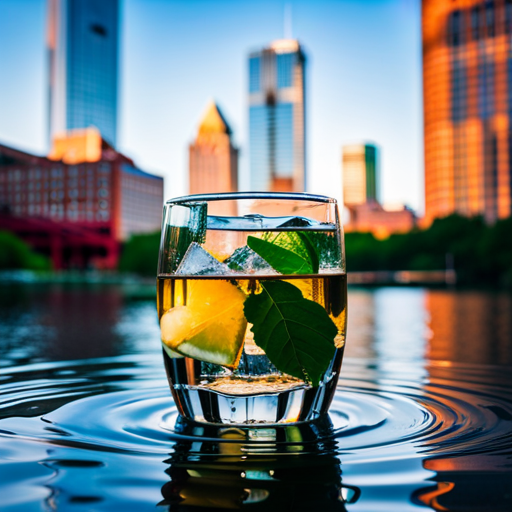Are you tired of drinking water that tastes like metal or has a strange odor? Look no further than Boston’s tap water, which is known for its softness and safety.
With an average water hardness ranging from 6 to 20 mg/L of calcium carbonate or 0.4 to 1.2 grains per gallon, Boston’s water supply is considered soft by USGS standards, making it a refreshing and reliable drink for residents and visitors alike.
You can thank the Massachusetts Water Resources Authority for providing over 200 million gallons of drinking water per day to Boston and 53 other municipalities in the state, ensuring that residents have access to clean and safe water.
The MWRA uses state-of-the-art treatment technologies to remove contaminants and impurities from the water, while also monitoring the water quality to ensure that it meets or exceeds federal and state standards.
In this article, we will explore Boston’s water supply system, the benefits of soft water, and the measures taken to ensure that Boston’s tap water remains a refreshing and safe drink.
Key Takeaways
– Boston has very soft water with an average hardness of 8 mg/L of calcium carbonate or 1 gpg, making it unnecessary to install a water softener.
– The Massachusetts Water Resources Authority provides over 200 million gallons of soft drinking water per day to residents of Boston and 53 other municipalities in Massachusetts from Quabbin Reservoir, Wachusett Reservoir, and Ware River.
– Boston’s soft water is due to the absence of calcium and magnesium ions in the reservoirs, which are filled with rainwater and melted snow from the surrounding area.
– The Carroll Water Treatment Plant uses various treatment technologies to ensure clean and safe water, including chemical treatments like ozone, sodium bisulfite, and sodium hypochlorite, and adds fluoride to make it safe for consumption.
Water Hardness in Boston
You’ll be happy to know that Boston has very soft water with an average hardness of only 8 milligrams per liter, making it refreshing and safe to drink. Compared to other cities, Boston’s water is significantly softer, with most of the state having soft water from the Massachusetts Water Resources Authority.
This means that you don’t have to worry about mineral deposits building up in your pipes and appliances, and your soap will be more effective. The benefits of soft water are numerous. Soft water is gentler on your skin and hair, making it easier to maintain healthy skin and hair.
It also reduces the amount of soap and detergent needed for cleaning, which can save you money. With Boston’s soft water, you can enjoy all of these benefits and more, without the hassle of hard water.
MWRA Water Supply
The MWRA provides drinking water to over 7 million residents in Massachusetts. Their supply comes from various reservoirs in the area, including Quabbin Reservoir, Wachusett Reservoir, and Ware River. Boston’s drinking water supply mainly comes from these sources.
To ensure clean and safe drinking water for residents, the water from these sources is collected and treated at the Carroll Water Treatment Plant. The MWRA uses various technologies and chemical treatments to control the quality of the water supplied to residents. These include ozone, ultraviolet light, and sodium hypochlorite to disinfect the water, as well as hydrofluorosilicic acid (fluoride) and sodium carbonate to adjust the pH level and improve dental health.
In addition, the MWRA conducts regular water quality monitoring and testing to ensure that the water supplied to residents meets or exceeds state and federal drinking water standards.
Treatment Technologies Used
If you’re wondering how the MWRA ensures the quality of the drinking water, they use various treatment technologies such as ozone, ultraviolet light, and sodium hypochlorite to disinfect the water. These technologies are effective in removing viruses, bacteria, and other microorganisms that may be present in the water. Additionally, the MWRA adds chemicals such as hydrofluorosilicic acid (fluoride) to prevent tooth decay and sodium bisulfite to remove excess chlorine.
Compared to other water treatment methods like boiling or reverse osmosis, using these treatment technologies has several advantages. Boiling water can remove bacteria and viruses, but it cannot remove contaminants like lead, pesticides, or pharmaceuticals. Reverse osmosis can remove these contaminants, but it wastes a lot of water and requires more energy. On the other hand, the MWRA’s treatment technologies are effective in removing various contaminants and are more energy-efficient than reverse osmosis. Additionally, the use of these technologies ensures that the water remains soft, which has several benefits for consumers.
Conclusion
Now that you’ve learned about Boston’s soft water supply and the measures taken to ensure its safety, you can enjoy a refreshing and reliable drink straight from the tap.
With an average water hardness ranging from 6 to 20 mg/L of calcium carbonate or 0.4 to 1.2 grains per gallon, Boston’s water is considered one of the softest in the country.
The Massachusetts Water Resources Authority provides over 200 million gallons of drinking water per day to Boston and 53 other municipalities in the state, making sure that the water is clean and safe for consumption.
You can trust in the treatment technologies used by the MWRA to remove impurities and contaminants from the water supply. With strict regulations and ongoing testing, you can rest assured that Boston’s tap water is a refreshing and safe drink.
So, next time you’re thirsty, don’t hesitate to grab a glass of Boston’s soft water straight from the tap.




